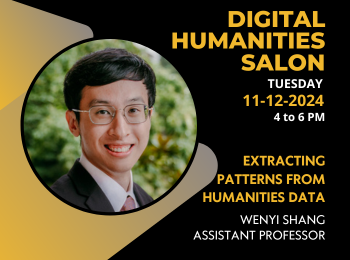Tuesday, November 12
114A Ellis Library
4 to 6 pm
Presentation at 4:15
Please join us in welcoming Assistant Professor Wenyi Shang, who will present “Extracting Patterns from Humanities Data” at 4:30. Stay to mix and mingle with others interested in the digital humanities and share ideas for the future of DH at Mizzou.
Digital humanities is sometimes seen as missing the deeper meanings in human interpretation, but with computational methods, researchers can find patterns in texts or history and analyze them critically. This talk will present two case studies that highlight how machine learning can help to classify poetry and how social network analyis can reveal political changes in ancient China.
Wenyi Shang joined the School of Information Science & Learning Technologies this fall, having earned his Ph.D. in Information Sciences from the University of Illinois Urbana-Champaign, and his bachelor’s degree in information management from Peking University, China. His research uses computational methods to study the development of human society. He has made contributions to digital humanities and computational social science, using the perspective of information science to inform and guide methodological reflection in both fields.
Talk Abstract: Digital humanities is often criticized for its perceived inability to capture the perspectival and interpretative nuances central to humanistic interpretation. However, with the aid of computational methods, digital humanists can engage in a process similar to Ludwig Wittgenstein’s concept of “seeing an aspect,” as illustrated in his famous “rabbit-duck illusion”: extracting patterns in literary texts or historical records and critically analyzing them to draw humanistic conclusions. This talk presents two case studies to exemplify this approach. The first uses machine learning models to classify English poetry by lexicon and prosody, shedding new light on the distinction between “genre” and “form.” The second applies social network analysis to explore the structural characteristics of political networks in Northern Song (960–1127 C.E.) China, revealing changes in political culture during the period.
To receive more DH@Mizzou news, please subscribe to the DIGHUMANITIES-L listserv.
